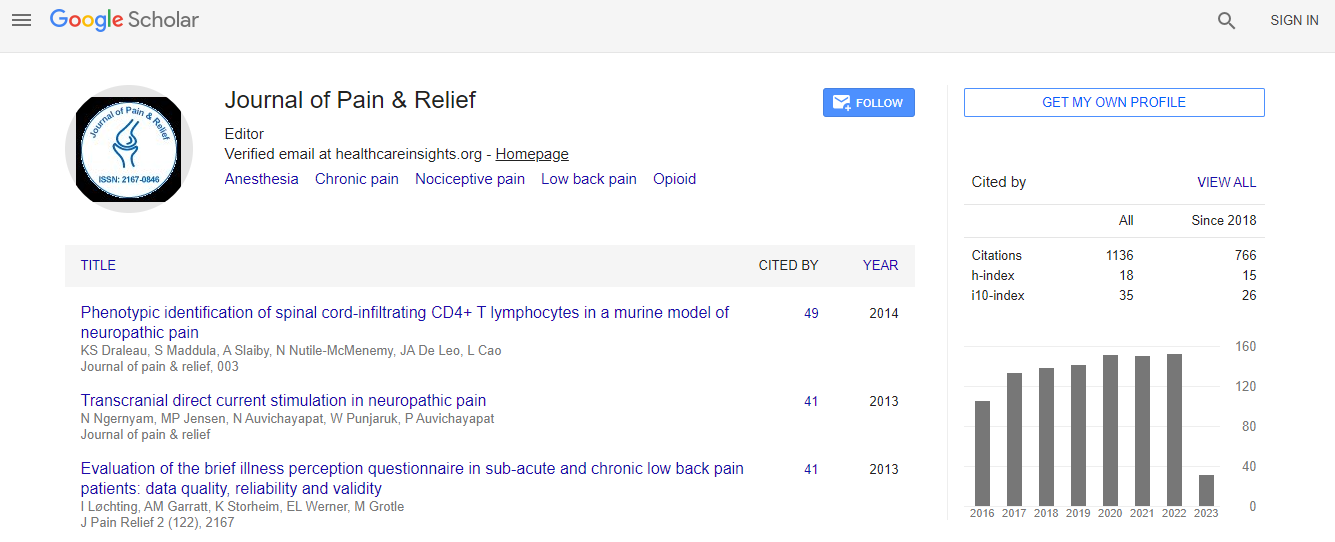Our Group organises 3000+ Global Conferenceseries Events every year across USA, Europe & Asia with support from 1000 more scientific Societies and Publishes 700+ Open Access Journals which contains over 50000 eminent personalities, reputed scientists as editorial board members.
Open Access Journals gaining more Readers and Citations
700 Journals and 15,000,000 Readers Each Journal is getting 25,000+ Readers
Recommended Conferences
42nd Global Conference on Nursing Care & Patient Safety
Toronto, CanadaGoogle Scholar citation report
Citations : 1583
Journal of Pain & Relief received 1583 citations as per Google Scholar report
Journal of Pain & Relief peer review process verified at publons
Indexed In
- Index Copernicus
- Google Scholar
- Open J Gate
- Genamics JournalSeek
- Cosmos IF
- RefSeek
- Hamdard University
- EBSCO A-Z
- OCLC- WorldCat
- Publons
- Geneva Foundation for Medical Education and Research
- Euro Pub
- ICMJE
Useful Links
Recommended Journals
Related Subjects
Share This Page
COX2/PGE2/EP4 signaling is involved in repeated restraint stress predisposed transition from acute to chronic pain
5th International Conference and Exhibition on Pain Research And Management
Weiya Ma
Douglas Mental Health University Institute, Canada McGill University, Canada
ScientificTracks Abstracts: J Pain Relief
Abstract
Chronic pain is a serious health issue that afflicts >20% of the population and causes the worst quality of life. Its treatments are challenging due to unclear mechanisms. Emerging evidence suggest that sensitization of nociceptive neurons along peripheral (dorsal root ganglion, DRG) and central (dorsal horn and brain) pain pathways contributes to chronic pain. Prevalence of prior stress experience is linked to high incidence of chronic pain. Stress, particularly repeated stress, induces maladaptive neuroplasticity along peripheral and central pain pathways. These plastic events facilitate persistent sensitization of nociceptive neurons and transition from acute to chronic pain. Prostaglandin E2 (PGE2), a pain mediator enriched in injured tissues, is involved in chronic pain. Its EP4 receptor, a major player in pathological pain conditions, is considered as a potential therapeutic target of chronic pain. In this study, we examined whether COC2/PGE2/EP4 signaling is involved in stress-prolonged sensitization pain, a model for transition from acute to chronic pain. We found that pre-exposure to single restraint stress abolished sensitization pain evoked by subsequent PGE2 challenge. However, pre-exposure to 3d consecutive restraint stress not only prolonged sensitization pain evoked by PGE2, but also increased stress hormone corticosterone (CORT) in serum, COX2 levels in paw skin, EP4 and TRPV1 levels in DRG and paw skin. Pre-exposure to CORT for 3d also prolonged pain evoked by PGE2 while co-injection of glucocorticoid receptor (GR) antagonist RU486 with 3d restraint stress prevented prolongation of sensitization pain. Co-injection of a selective COX2 inhibitor NS-398 or a selective EP4 receptor antagonist L161,982 attenuated 3d restraint stress prolonged sensitization pain. In DRG cultures, in a concentration-dependent manner, CORT induced an increase in EP4 and TRPV1 protein levels via GR activation. These data suggest that stress-up-regulated COX2/PGE2/EP4 signaling and TRPV1 channel in peripheral pain pathway contribute to stress-predisposed transition from acute to chronic pain.Biography
Weiya Ma earned her PhD from Dept. of Pharmacology and Therapeutics at McGill University, Canada. She is now a Faculty Member at Douglas Institute and Dept. of Psychiatry, McGill University, Montreal, Canada. Thus far she has published more than 70 research articles and numerous book chapters. Her studies unraveled the role of neuropeptides in chronic pain conditions and morphine tolerance. Her pioneer work exploring the role of PGE2 in neuropathic pain and prolonged sensitization pain has let her become a Leader in this field.

 Spanish
Spanish  Chinese
Chinese  Russian
Russian  German
German  French
French  Japanese
Japanese  Portuguese
Portuguese  Hindi
Hindi 
